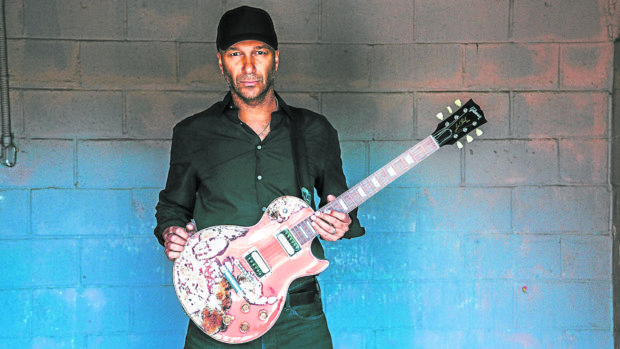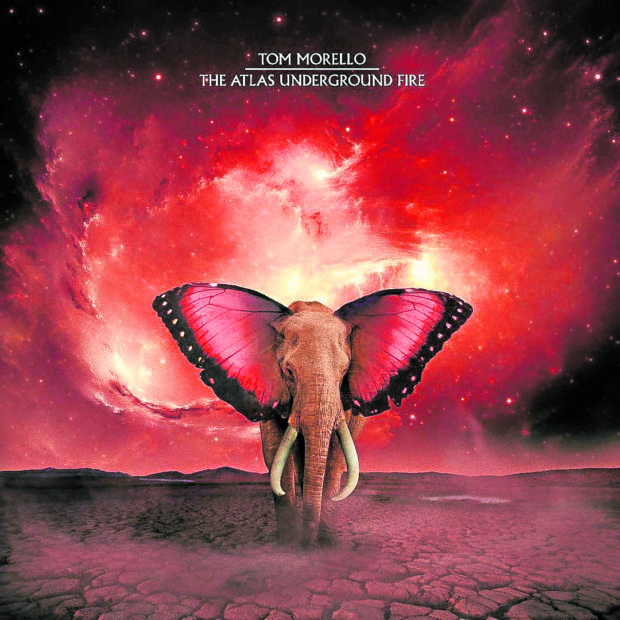Tom Morello on mixing music and activism and ‘The Atlas Underground Fire’ as his ‘antidepressant’
Music and activism have always gone hand in hand for Tom Morello.
That much is apparent in his fervid work as a solo artist, for the revolutionary rock band Rage Against the Machine, and for his other music projects and groups, like Axis of Justice and The Nightwatchman. The way he sees it, it’s imperative that his creative process intertwines and reflects his core as a person. “If you have opinions and you don’t include them in your work—whether you’re an artist, a guitarist, a teacher or a carpenter—you leave behind who you are in what you do. And that to me, isn’t the way I would want to live life,” Tom told the Inquirer in a one-on-one interview arranged by Blackstar Asia for his upcoming solo album, “The Atlas Underground Fire.”
“It’s important to weave your soul, your ideas and beliefs into your vocation, whatever it is,” added the music artist and political activist, who, through his extensive catalog of work, has spoken about a gamut of political and societal issues from government oppression and racism to human rights and environmental crises.
But bafflingly enough, there are listeners who remain oblivious, intentionally or not, about this aspect of Tom’s music. In fact, there were not a few self-proclaimed fans who didn’t realize that Rage Against the Machine was a political group until recently.
Last year, a Twitter user ranted about not wanting to hear “political BS” in music, and how he used to be a fan of Tom’s before he started voicing out his political opinions. Tom retorted: “What music of mine were you a fan of that didn’t contain political BS? I need to know so I can delete it from the catalog.”
What does he think about fans who tell musicians to stick to just, well…making music? “Some people don’t like it, not because they don’t want opinions in music, but because they disagree with your opinions in the music they like…That’s when they have a problem with it,” he said. These people are still welcome to listen to his work, he said, but don’t expect him to change his stand or cater to theirs. “If your opinions differ from mine, you’re still welcome to enjoy the music or come to a concert, you’re welcome to not understand anything about what’s going on. You know what I mean? Like, that’s totally fine,” he said.
“But if you think that I’m going to change what I say in my music, interviews or tweets, because it upsets or offends you, then you haven’t been paying attention for the last 30 years,” Tom stressed.
The same is true for his new and third solo album, “The Atlas Underground Fire.” Set to drop on Oct. 15, the new record is said to contain “threads” of his “social justice manifestos.” And because it was written and produced amid the pandemic, the album also captures the anxiety and uncertainty that pervade the world.
In terms of sound, the 12-track album features 12 collaborators who allowed Tom to pursue a “new sonic territory” and “create powerful alloys of different genres” with his songwriting and guitar-playing.
Excerpts from our Q&A with Tom:
One of your latest singles, “Driving to Texas” with Phantogram, has this haunting, almost ominous feel to it. Is that the vibe you’re going for in the album?
The album is quite diverse—from the first single, a cover of the AC/DC classic “Highway to Hell,” to this Phantogram song that you accurately describe as a sort of eerie and spooky electronic jam with a crazy guitar solo.
But it’s a record of collaborations. And each one sort of found its own tone and voice based on the chemistry among myself and the other artists. There’s “Let’s Get the Party Started” with Bring Me the Horizon, which is a huge heavy-rock jam. There’s “The War Inside” with Chris Stapleton, which is country, western-style.
We have a great Palestinian DJ (Sama’ Abdulhadi) and we did an almost Arabic trance-like song. We have a political rocker with the artist Grandson. Damian Marley brings his reggae vibe with big heavy riffs. The songs aren’t hemmed in by any preestablished parameters.
It’s interesting that you chose a cover for your lead single.
Well, Bruce Springsteen, Eddie Vedder and I have a history with “Highway to Hell.” I was performing with the E Street Band on an Australian tour in 2014. When we were in Perth, Australia, the home of AC/DC’s Bon Scott, I paid my respects at his grave one night, and then went back to the hotel lobby, where I saw Bruce Springsteen, and I said, “Do you think there’s a possibility of AC/DC and the E Street Band overlapping in any way?”
We rehearsed the song during soundcheck in the next couple of days. Then, we found ourselves in a big Melbourne football stadium with about 80,000 people, and Eddie Vedder happened to be there. He was on a solo tour at the time.
I suggested to Bruce, “You know, here in Australia where AC/DC is king, the song ‘Highway to Hell’ is like the alternative national anthem. Why don’t we open the concert with ‘Highway to Hell’ with Eddie singing?” We did, and the fans went as crazy as you have ever seen an audience go.
While working on the album, I thought about wanting to make a song with some of my rock brothers. And I remembered that night in Melbourne, which made me want to recapture that magical moment.
You have quite the lineup there. How do you choose your collaborators?
This was a record that was made during lockdown. I was completely alone in my studio. It was challenging because, while I have a studio, I don’t know how to run it; there’s always an engineer that does that work while I just play guitar. So the studio was basically useless to me. I had a breakthrough, though, when I read that Kanye West had recorded the vocals for his albums using the voice memo of his phone. So I just started recording guitars straight onto my phone, and then sent those guitar riffs to producers and engineers around the world — from Jerusalem to Rio de Janeiro to London to Stockholm to New Jersey. Every day, I would go up there and come up with some new ideas. I would think, “With whom would I like to work today?” So, I see if they’re interested and send the music off. The record was made very spontaneously in that regard.
Did you have difficulties with this process?
Absolutely. “The Atlas Underground Fire” is my 21st album. A lot of those other records were made with four guys in a room. On the other hand, this record was made entirely by myself, but with a global community of collaborators around the world. You get the best of both worlds in a number of ways, because, when you’re a solo artist, you get a purity of vision. This is how it’s going to be, and it’s undiluted by other people’s ideas. But when you’re in a band, you get chemistry, and you get to create stuff that you can’t do on your own.
It’s a Tom Morello solo record, but each of the 12 songs is a collaboration that couldn’t have happened without the interaction and input of my artistic partners.
What was it like creating music amid a pandemic?
During a time where there was a lot of fear and anxiety surrounding the pandemic, this record became a lifeline… like a life raft. And the ability to connect and communicate with these other musicians and express myself —even when I was alone, knowing that one day people would hear this music, was really helpful.
Did you channel the things you had been feeling amid the pandemic into your creative process?
In order for music to be compelling, I believe it needs to be authentic. And the record was made during a time where there was a lot of anxiety. And I didn’t want to hide that on the record.
This album was like an antidepressant, an oasis in a year of unknowns. The one thing that I knew for sure was, I was going to go up there every day to create music—either on my own or virtually with some friends— and be able to continue to be a music artist during a time in history that was very difficult and different for musicians.
Have you played live shows since the pandemic started and do you plan to?
I have done some like virtual shows on Zoom, some charity shows, things like that—but no shows yet. I want to wait till such a time when it’s really safe for the bands, the crew and fans. Some friends of mine who are out on tours keep getting shut down, because someone in the band or crew is getting COVID.
What are your thoughts on the pandemic putting a lid on the live-music scene? What do you miss about it?
I felt very uncertain, it’s depressing.
This has been the longest period of time I have gone without playing a show. The thing I miss most is the connection. One of the reasons I play music is to express myself, but even more important is to connect with an audience. It’s like music predates spoken language, you know. And so the idea of a tribe gathering together, with these rhythms and truths, this feeling of togetherness, and rocking like crazy… There’s nothing like it.
It’s not only fun to do. It’s something that’s very much in our DNA, something we do in order to feel alive. INQ
















